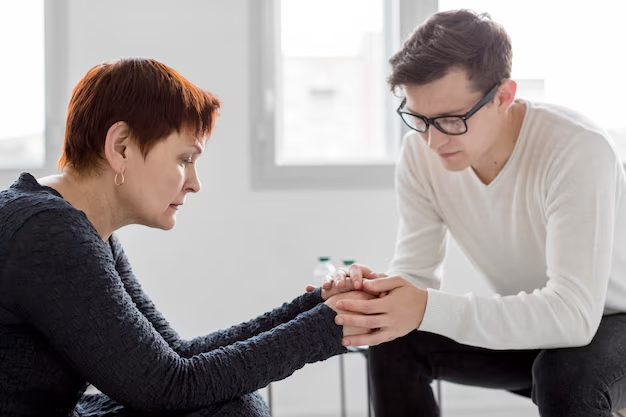Supporting Someone with PTSD: What You Need to Know
Living with Post-Traumatic Stress Disorder (PTSD) can be an overwhelming experience—not just for those who endure it, but also for their friends and loved ones. When someone you care about is suffering, it’s natural to want to help. But where do you start? Knowing how to support someone with PTSD can make a profound difference in their recovery journey. Let’s explore some practical ways to offer the support and understanding they need.
Understanding PTSD
What is PTSD?
Post-Traumatic Stress Disorder (PTSD) is a mental health condition triggered by experiencing or witnessing a traumatic event. This can include anything from combat and natural disasters to serious accidents or personal assaults. PTSD is characterized by symptoms such as intrusive memories, avoidance, negative changes in mood and thinking, and alterations in physical and emotional reactions.
Recognizing Symptoms
Recognizing the signs of PTSD is crucial in providing the right support. Here's what to look for:
- Intrusive Thoughts: Recurring, unwanted memories of the traumatic event.
- Avoidance: Steering clear of places, people, or activities that are reminders of the trauma.
- Negative Mood Changes: Persistent feelings of fear, guilt, or shame.
- Reactivity Symptoms: Being easily startled, feeling tense, or having difficulty sleeping.
Understanding these symptoms can help you approach the situation with empathy and patience.
Building a Supportive Environment
Open Lines of Communication
The first step in helping someone with PTSD is creating and maintaining open lines of communication. Here’s how:
- Listen Actively: Pay attention and show genuine interest in what they are saying without interrupting.
- Encourage Expression: Let them know it’s okay to share their feelings at their own pace.
- Be Patient: Understand that discussing trauma can be difficult and may take time.
Create a Safe Space
Creating a sense of safety is crucial for those dealing with PTSD. You can achieve this by:
- Establishing Routine: Stability and predictability can help reduce stress.
- Reducing Triggers: Be mindful of triggers and work with them to avoid situations that might cause distress.
- Offering Reassurance: Let them know you’re there for them and that they’re not alone.
Practical Ways to Support
Encourage Professional Help
While your support is vital, professional guidance from therapists who specialize in trauma is essential for recovery. Encourage your loved one to seek professional help:
- Respect Their Pace: Don’t pressure them but suggest seeing a therapist as a helpful step.
- Offer to Help Find Resources: Assist in locating PTSD specialists or support groups.
- Attend Sessions: If appropriate, attend therapy sessions with them for additional support.
Support Healthy Habits
Promoting healthy habits can significantly impact someone with PTSD by improving their overall well-being. Consider these strategies:
- Engage in Physical Activity: Encourage them to partake in regular exercise, which can help reduce stress.
- Promote Good Nutrition: Eating well-balanced meals can support mental health.
- Facilitate Rest: Encourage good sleep hygiene and relaxation practices like yoga or meditation.
Navigating Challenges Together
Handling Difficult Moments
It’s common for individuals with PTSD to have challenging days. Here’s how you can be supportive:
- Be Present: Sometimes, your presence is all that’s needed.
- Stay Calm: Remaining calm and composed can help de-escalate tense situations.
- Practice Grounding Techniques: Help them focus on the present by engaging in simple grounding exercises.
Setting Boundaries
Supporting someone with PTSD requires setting boundaries to protect your well-being:
- Know Your Limits: It’s okay to recognize what you can handle and when to seek outside help.
- Encourage Independence: Support them in making their own decisions as part of their healing process.
- Practice Self-Care: Taking care of your own mental health ensures you can continue to provide support.
Maintaining Hope and Encouragement
Celebrate Progress
Acknowledge the small victories on their road to recovery:
- Recognize Milestones: Celebrate every step forward, no matter how small.
- Positive Reinforcement: Offer praise and encouragement to boost their confidence.
- Focus on Strengths: Remind them of their resilience and capabilities.
Stay Informed
Continuing education about PTSD can enhance your ability to offer effective support:
- Stay Updated: Learn about PTSD through books, reliable online resources, or support groups.
- Share Knowledge: Discuss what you learn with your loved one and validate their experiences.
- Empower Through Information: Use knowledge to empower them to explore coping strategies that work best for them.
Finding Community and Support
Join Support Networks
Finding community support can provide immense relief both for you and your loved one:
- Seek Support Groups: Explore PTSD support groups that offer understanding and shared experiences.
- Foster Connections: Encourage contact with individuals who have managed similar experiences.
- Build Your Support System: Find friends or groups focused on supporting caregivers.
Moving Forward
Supporting someone with PTSD is a journey that requires patience, empathy, and understanding. By creating a nurturing environment, encouraging healthy habits, and seeking community resources, you can provide immense comfort to your loved one. Remember, the path to recovery is not taken alone, and your support plays a pivotal role in their healing process.
Summary of Key Takeaways & Tips
- 🗣️ Communicate Openly: Listen actively and encourage expression.
- 🏡 Create Safety: Build predictable routines and avoid triggers.
- 👩⚕️ Professional Help: Advocate for therapy with trauma specialists.
- 🥗 Healthy Habits: Encourage physical activity, nutrition, and rest.
- 🤝 Handle Challenges: Be present, calm, and use grounding techniques.
- 🚧 Set Boundaries: Protect your mental health and encourage independence.
- 🌟 Celebrate Progress: Recognize and praise small victories.
- 📚 Stay Informed: Continuously educate yourself about PTSD.
- 🤗 Find Community: Engage in support networks for shared experiences.
Supporting someone with PTSD is a profound journey. By embracing understanding and compassion, you’re not just helping them; you’re forging a bond that strengthens both your relationship and their path toward healing.

